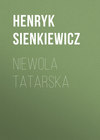Kitabı oku: «The Deluge. Vol. 1», sayfa 42
CHAPTER XXXVIII
The words of the young daughter of the starosta of Sohachev filled Kmita with great consolation, and for three days they did not leave his head. In the daytime on horseback, in the night on the bed, he was thinking of what had happened to him, and he came always to the conclusion that this could not be simple chance, but an indication from God, and a presage that if he would hold out, if he would not leave the good road, that same road which Olenka had shown him, she would keep faith and give him her former affection.
"If the starosta's daughter," thought Kmita, "keeps faith with her Andrei, who has not begun to grow better, there is still hope for me, with my honest intention of serving virtue, the country, and the king."
But, on the other hand, suffering was not absent from Pan Andrei. He had an honest intention, but had it not come too late? Was there yet any road, were there yet any means? The Commonwealth seemed to sink deeper each day, and it was difficult to close one's eyes to the terrible truth that for it there was no salvation. Kmita wished nothing more intently than to begin some kind of work, but he saw no willing people. Every moment new figures, every moment new faces, passed before him in the time of his journey; but the sight of them, their talk and discussions, merely took from him the remnant of his hopes.
Some had gone body and soul to the Swedish camp, seeking in it their own profit; these people drank and caroused as at a wake, drowning, in cups and in riot, shame and the honor of nobles; others told, with blindness beyond understanding, of that power which the Commonwealth would form in union with Sweden, under the sceptre of the first warrior on earth; and these were the most dangerous, for they were sincerely convinced that the whole earth must bow before such an alliance. A third party, like the starosta of Sohachev, honorable people and wishing well to the country, sought signs on the earth and in the heavens, repeated prophecies, and seeing the will of God and unbending predestination in all things that happened, came to the conclusion that there was no hope, no salvation; that the end of the world was drawing nigh; therefore it would be madness to think of earthly instead of heavenly salvation. Others hid in the forest, or escaped with their lives beyond the boundaries of the Commonwealth. Kmita met only unrestrained, corrupted, mad, timid, or desperate people. He met no man who had hope.
Meanwhile the fortune of the Swedes was increasing. News that the rest of the army had revolted, were conspiring, threatening the hetmans, and wishing to go over to the Swedes, gained certainty every day. The report that Konyetspolski with his division had joined Karl Gustav reverberated like thunder through every corner of the Commonwealth, and drove out the remnant of faith from men's hearts, for Konyetspolski was a knight of Zbaraj. He was followed by the starosta of Yavor and Prince Dymitr Vishnyevetski, who was not restrained by a name covered with immortal glory.
Men had begun now to doubt Lyubomirski, the marshal. Those who knew him well asserted that ambition surpassed in him both reason and love of country; that for the time being he was on the king's side because he was flattered, because all eyes were turned to him, because one side and the other tried to win him, to persuade him, because he was told that he had the fate of the country in his hands. But in view of Swedish success he began to hesitate, to delay; and each moment he gave the unfortunate Yan Kazimir to understand more clearly that he could save him, or sink him completely.
The refugee king was living in Glogov with a handful of trusted persons, who shared his fate. Each day some one deserted him, and went over to the Swedes. Thus do the weak bend in days of misfortune, even men to whom the first impulse of the heart points out the thorny path of honor. Karl Gustav received the deserters with open arms, rewarded them, covered them with promises, tempted and attracted the remnant of the faithful, extended more widely his rule; fortune itself pushed from before his feet every obstacle; he conquered Poland with Polish forces; he was a victor without a battle.
Crowds of voevodas, castellans, officials of Poland and Lithuania, throngs of armed nobles, complete squadrons of incomparable Polish cavalry, stood in his camp, watching the eyes of their newly made lord and ready at his beck.
The last of the armies of the kingdom was calling more and more emphatically to its hetman: "Go, incline thy gray head before the majesty of Karl, – go, for we wish to belong to the Swedes."
"To the Swedes! to the Swedes!"
And in support of these words thousands of sabres flashed forth.
At the same time war was flaming continually on the east. The terrible Hmelnitski was besieging Lvoff again; and legions of his allies, rolling on past the unconquered walls of Zamost, spread over the whole province of Lubelsk, reaching even to Lublin.
Lithuania was in the hands of the Swedes and Hovanski. Radzivill had begun war in Podlyasye, the elector was loitering, and any moment he might give the last blow to the expiring Commonwealth; meanwhile he was growing strong in Royal Prussia.
Embassies from every side were hastening to the King of Sweden, wishing him a happy conquest.
Winter was coming; leaves were falling from the trees; flocks of ravens, crows, and jackdaws had deserted the forests, and were flying over the villages and towns of the Commonwealth.
Beyond Pyotrkoff Kmita came again upon Swedish parties, who occupied all the roads and highways. Some of them, after the capture of Cracow, were marching to Warsaw, for it was said that Karl Gustav, having received homage from the northern and eastern provinces and signed the "capitulations," was only waiting for the submission of those remnants of the army under Pototski and Lantskoronski; that given, he would go straightway to Prussia, and therefore he was sending the army ahead. The road was closed in no place to Pan Andrei, for in general nobles roused no suspicion. A multitude of armed attendants were going with the Swedes; others were going to Cracow, – one to bow down before the new king, another to obtain something from him. No one was asked for a pass or a letter, especially since in the neighborhood of Karl, who was counterfeiting kindness, no man dared trouble another.
The last night before Chenstohova met Pan Andrei in Krushyn; but barely had he settled down when guests arrived. First a Swedish detachment of about one hundred horse, under the lead of a number of officers and some important captain. This captain was a man of middle age, of a form rather imposing, large, powerful, broad-shouldered, quick-eyed; and though he wore a foreign dress and looked altogether like a foreigner, still when he entered the room he spoke to Pan Andrei in purest Polish, asking who he was and whither he was going.
Pan Andrei answered at once that he was a noble from Sohachev, for it might have seemed strange to the officer that a subject of the elector had come to that remote place. Learning that Pan Andrei was going to the King of Sweden with complaint that payment of money due him by the Swedes was refused, the officer said, -
"Prayer at the high altar is best, and wisely you go to the king; for though he has a thousand affairs on his head, he refuses hearing to no one, and he is so kind to Polish nobles that you are envied by the Swedes."
"If only there is money in the treasury?"
"Karl Gustav is not the same as your recent Yan Kazimir, who was forced to borrow even of Jews, for whatever he had he gave straightway to him who first asked for it. But if a certain enterprise succeeds, there will be no lack of coin in the treasury."
"Of what enterprise is your grace speaking?"
"I know you too little to speak confidentially, but be assured that in a week or two the treasury of the King of Sweden will be as weighty as that of the Sultan."
"Then some alchemist must make money for him, since there is no place from which to get it in this country."
"In this country? It is enough to stretch forth daring hands. And of daring there is no lack among us, as is shown by the fact that we are now rulers here."
"True, true," answered Kmita; "we are very glad of that rule, especially if you teach us how to get money like chips."
"The means are in your power, but you would rather die of hunger than take one copper."
Kmita looked quickly at the officer, and said, -
"For there are places against which it is terrible, even for Tartars, to raise hands."
"You are too mysterious. Sir Cavalier," answered the officer, "and remember that you are going, not to Tartars, but to Swedes for money."
Further conversation was interrupted by the arrival of a new party of men, whom the officer was evidently expecting, for he hurried out of the inn. Kmita followed and stood in the door to see who were coming.
In front was a closed carriage drawn by four horses, and surrounded by a party of Swedish horsemen; it stopped before the inn. The officer who had just been talking to Kmita went up to the carriage quickly, and opening the door made a low bow to the person sitting inside.
"He must be some distinguished man," thought Kmita.
That moment they brought from the inn a flaming torch. Out of the carriage stepped an important personage dressed in black, in foreign fashion, with a cloak to his knees, lined with fox-skin, and a hat with feathers. The officer seized the torch from the hands of a horseman, and bowing once more, said, -
"This way, your excellency!"
Kmita pushed back as quickly as possible, and they entered after him. In the room the officer bowed a third time and said, -
"Your excellency, I am Count Veyhard Vjeshchovich, ordinarius proviantmagister, of his Royal Grace Karl Gustav, and am sent with an escort to meet your excellency."
"It is pleasant for me to meet such an honorable cavalier," said the personage in black, giving bow for bow.
"Does your excellency wish to stop here some time or to go on at once? His Royal Grace wishes to see your excellency soon."
"I had intended to halt at Chenstohova for prayers," answered the newly arrived, "but in Vyelunie I received news that his Royal Grace commands me to hurry; therefore, after I have rested, we will go on. Meanwhile dismiss the escort, and thank the captain who led it."
The officer went to give the requisite order. Pan Andrei stopped him on the way.
"Who is that?" asked he.
"Baron Lisola, the Imperial Envoy, now on his way from the court of Brandenburg to our lord," answered the officer. Then he went out, and after a while returned.
"Your excellency's orders are carried out," said he to the baron.
"I thank you," said Lisola; and with great though very lofty affability he indicated to Count Veyhard a place opposite himself. "Some kind of storm is beginning to whistle outside," said he, "and rain is falling. It may continue long; meanwhile let us talk before supper. What is to be heard here? I have been told that the voevodas of Little Poland have submitted to his Grace of Sweden."
"True, your excellency; his Grace is only waiting for the submission of the rest of the troops, then he will go at once to Warsaw and to Prussia."
"Is it certain that they will surrender?"
"Deputies from the army are already in Cracow. They have no choice, for if they do not come to us Hmelnitski will destroy them utterly."
Lisola inclined his reasoning head upon his breast. "Terrible, unheard of things!" said he.
The conversation was carried on in the German language. Kmita did not lose a single word of it.
"Your excellency." said Count Veyhard, "that has happened which had to happen."
"Perhaps so; but it is difficult not to feel compassion for a power which has fallen before our eyes, and for which a man who is not a Swede must feel sorrow."
"I am not a Swede; but if Poles themselves do not feel sorrow, neither do I," answered the count.
Lisola looked at him seriously. "It is true that your name is not Swedish. From what people are you, I pray?"
"I am a Cheh" (Bohemian).
"Indeed? Then you are a subject of the German emperor? We are under the same rule."
"I am in the service of the Most Serene King of Sweden," said Veyhard, with a bow.
"I wish not to derogate from that service in the least," answered Lisola, "but such employments are temporary; being then a subject of our gracious sovereign, whoever you may be, whomsoever you may serve, you cannot consider any one else as your natural sovereign."
"I do not deny that."
"Then I will tell you sincerely, that our lord mourns over this illustrious Commonwealth, over the fate of its noble monarch, and he cannot look with a kindly or willing eye on those of his subjects who are aiding in the final ruin of a friendly power. What have the Poles done to you, that you show them such ill will?"
"Your excellency, I might answer many things, but I fear to abuse your patience."
"You seem to me not only a famous soldier, but a wise man. My office obliges me to observe, to listen, to seek causes; speak then, even in the most minute way, and fear not to annoy my patience. If you incline at any time to the service of the emperor, which I wish most strongly, you will find in me a friend who will explain and repeat your reasons, should any man wish to consider your present service as wrong."
"Then I will tell you all that I have on my mind. Like many nobles, younger sons, I had to seek my fortune outside my native land. I came to this country where the people are related to my own, and take foreigners into service readily."
"Were you badly received?"
"Salt mines were given to my management I found means of livelihood, of approach to the people and the king himself; I serve the Swedes at present, but should any one wish to consider me unthankful, I could contradict him directly."
"How?"
"Can more be asked of me than of the Poles themselves? Where are the Poles to-day? Where are the senators of this kingdom, the princes, the magnates, the nobles, if not in the Swedish camp? And still they should be the first to know what they ought to do, where the salvation of their country is, and where its destruction. I follow their example; who of them then has the right to call me unthankful? Why should I, a foreigner, be more faithful to the King of Poland and the Commonwealth than they themselves are? Why should I despise that service for which they themselves are begging?"
Lisola made no answer. He rested his head on his hand and fell into thought. It would seem that he was listening to the whistle of the wind and the sound of the autumn rain, which had begun to strike the windows of the inn.
"Speak on," said he, at last; "in truth you tell me strange things."
"I seek fortune where I can find it," continued Count Veyhard; "and because this people are perishing, I do not need to care for them more than they do for themselves, besides, even if I were to care, it would avail nothing, for they must perish."
"But why is that?"
"First, because they wish it themselves; second, because they deserve it. Your excellency, is there another country in the world where so many disorders and such violence may be seen? What manner of government is there here? The king does not rule, because they will not let him; the diets do not rule, because the members break them; there is no army, because the Poles will not pay taxes; there is no obedience, for obedience is opposed to freedom; there is no justice, for there is no one to execute decisions, and each strong man tramples on decisions; there is no loyalty in this people, for all have deserted their king; there is no love for the country, for they have given it to the Swede, for the promise that he will not prevent them from living in old fashion according to their ancient violence. Where could anything similar be found? What people in the world would aid an enemy in conquering their own country? Who would desert a king, not for his tyranny, not for his evil deeds, but because a stronger one came? Where is there a people who love private profits more, or trample more on public affairs? What have they, your excellency? Let any one mention to me even one virtue, – prudence, reason, cleverness, endurance, abstinence. What have they? Good cavalry? that and nothing more. But the Numidians were famous for cavalry, and the Gauls, as may be read in Roman history, had celebrated soldiers; but where are they? They have perished as they were bound to perish. Whoso wishes to save the Poles is merely losing time, for they will not save themselves. Only the mad, the violent, the malicious, and the venal inhabit this land."
Count Veyhard pronounced the last words with a genuine outburst of hatred marvellous in a foreigner who had found bread among that people; but Lisola was not astonished. A veteran diplomat, he knew the world and men. He knew that whoso does not know how to pay his benefactor with his heart, seeks in him faults, so as to shield with them his own unthankfulness. Besides, it may be that he recognized that Count Veyhard was right. He did not protest, but asked quickly, "Are you a Catholic?"
The count was confused. "Yes, your excellency," answered he.
"I have heard in Vyelunie that there are persons who persuade the king, Karl Gustav, to occupy the monastery of Yasna Gora.30 Is it true?"
"Your excellency, the monastery lies near the Silesian boundary, and Yan Kazimir can easily receive messages therefrom. We must occupy it to prevent that. I was the first to direct attention to this matter, and therefore his Royal Grace has confided these functions to me."
Here Count Veyhard stopped suddenly, remembered Kmita, sitting in the other corner of the room, and coming up to him, asked, -
"Do you understand German?"
"Not a word, even if a man were to pull my teeth," answered Pan Andrei.
"That is too bad, for we wished to ask you to join our conversation." Then he turned to Lisola.
"There is a strange noble here, but he does not understand German; we can speak freely."
"I have no secret to tell," said Lisola; "but as I am a Catholic too, I should not like to see such injustice done to a sacred place. And because I am certain that the most serene emperor has the same feeling, I shall beg his Grace the King of Sweden to spare the monks. And do not hurry with the occupation until there is a new decision."
"I have express, though secret, instructions; but I shall not withhold them from your excellency, for I wish to serve faithfully my lord the emperor. I can assure your excellency that no profanation will come to the sacred place. I am a Catholic."
Lisola laughed, and wishing to extort the truth from a man less experienced than himself, asked jokingly, -
"But you will shake up their treasury for the monks? It will not pass without that, will it?"
"That may happen," answered Count Veyhard. "The Most Holy Lady will not ask for thalers from the priors' caskets. When all others pay, let the monks pay too."
"But if the monks defend themselves?"
The count laughed. "In this country no man will defend himself, and to-day no man is able. There was a time for defence, – now it is too late."
"Too late," repeated Lisola.
The conversation ended there. After supper they went away. Kmita remained alone. This was for him the bitterest night that he had spent since leaving Kyedani. While listening to the words of Count Veyhard, Kmita had to restrain himself with all his power to keep from shouting at him, "Thou liest, thou cur!" and from falling on him with his sabre. But if he did not do so, it was unhappily because he felt and recognized truth in the words of the foreigner, – awful truth burning like fire, but genuine.
"What could I say to him?" thought he; "with what could I offer denial except with my fist? What reasons could I bring? He snarled out the truth. Would to God he were slain! And that statesman of the emperor acknowledged to him that in all things and for all defence it was too late."
Kmita suffered in great part perhaps because that "too late" was the sentence not only of the country, but of his own personal happiness. And he had had his fill of suffering; there was no strength left in him, for during all those weeks he had heard nothing save, "All is lost, there is no time left, it is too late." No ray of hope anywhere fell into his soul.
Ever riding farther, he had hastened greatly, night and day, to escape from those prophecies, to find at last some place of rest, some man who would pour into his spirit even one drop of consolation. But he found every moment greater fall, every moment greater despair. At last the words of Count Veyhard filled that cup of bitterness and gall; they showed to him clearly this, which hitherto was an undefined feeling, that not so much the Swedes, the Northerners, and the Cossacks had killed the country, as the whole people.
"The mad, the violent, the malicious, the venal, inhabit this land," repeated Kmita after Count Veyhard, "and there are no others! They obey not the king, they break the diets, they pay not the taxes, they help the enemy to the conquest of this land. They must perish.
"In God's name, if I could only give him the lie! Is there nothing good in us save cavalry; no virtue, nothing but evil itself?"
Kmita sought an answer in his soul. He was so wearied from the road, from sorrows, and from everything that had passed before him, that it grew cloudy in his head. He felt that he was ill and a deathly sickness seized possession of him. In his brain an ever-growing chaos was working. Faces known and unknown pushed past him, – those whom he had known long before and those whom he had met on this journey. Those figures spoke, as if at a diet, they quoted sentences, prophecies; and all was concerning Olenka. She was awaiting deliverance from Kmita; but Count Veyhard held him by the arms, and looking into his eyes repeated: "Too late! what is Swedish is Swedish!" and Boguslav Radzivill sneered and supported Count Veyhard. Then all of them began to scream: "Too late, too late, too late!" and seizing Olenka they vanished with her somewhere in darkness.
It seemed to Pan Andrei that Olenka and the country were the same, that he had ruined both and had given them to the Swedes of his own will. Then such measureless sorrow grasped hold of him that he woke, looked around in amazement and listening to the wind which in the chimney, in the walls, in the roof, whistled in various voices and played through each cranny, as if on an organ.
But the visions returned, Olenka and the country were blended again in his thoughts in one person whom Count Veyhard was conducting away saying: "Too late, too late!"
So Pan Andrei spent the night in a fever. In moments of consciousness he thought that it would come to him to be seriously ill, and at last he wanted to call Soroka to bleed him. But just then dawn began; Kmita sprang up and went out in front of the inn.
The first dawn had barely begun to dissipate the darkness; the day promised to be mild; the clouds were breaking into long stripes and streaks on the west, but the east was pure; on the heavens, which were growing pale gradually, stars, unobscured by mist, were twinkling. Kmita roused his men, arrayed himself in holiday dress, for Sunday had come and they moved to the road.
After a bad sleepless night, Kmita was wearied in body and spirit. Neither could that autumn morning, pale but refreshing, frosty and clear, scatter the sorrow crushing the heart of the knight. Hope in him had burned to the last spark, and was dying like a lamp in which the oil is exhausted. What would that day bring? Nothing! – the same grief, the same suffering, rather it will add to the weight on his soul; of a surety it will not decrease it.
He rode forward in silence, fixing his eyes on some point which was then greatly gleaming upon the horizon. The horses were snorting; the men fell to singing with drowsy voices their matins.
Meanwhile it became clearer each moment, the heavens from pale became green and golden and that point on the horizon began so to shine that Kmita's eyes were dazzled by its glitter. The men ceased their singing and all gazed in that direction, at last Soroka said, -
"A miracle or what? – That is the west, and it is as if the sun were rising."
In fact, that light, increased in the eyes: from a point it became a ball, from a ball a globe; from afar you would have said that some one had hung above the earth a giant star, which was scattering rays immeasurable.
Kmita and his men looked with amazement on that bright, trembling, radiant vision, not knowing what was before their sight. Then a peasant came along from Krushyn in a wagon with a rack. Kmita turning to him saw that the peasant, holding his cap in his hand and looking at the light, was praying.
"Man," asked Pan Andrei, "what is that which shines so?"
"The church on Yasna Gora."
"Glory to the Most Holy Lady!" cried Kmita. He took his cap from his head, and his men removed theirs.
After so many days of suffering, of doubts, and of struggles, Pan Andrei felt suddenly that something wonderful was happening in him, Barely had the words, "the church on Yasna Gora," sounded in his ears when the confusion fell from him as if some hand had removed it.
A certain inexplicable awe seized hold of Pan Andrei, full of reverence, but at the same time a joy unknown to experience, great and blissful. From that church shining on the height in the first rays of the sun, hope, such as for a long time Pan Andrei had not known, was beating, – a strength invincible on which he wished to lean. A now life, as it were, entered him and began to course through his veins with the blood. He breathed as deeply as a sick man coming to himself out of fever and unconsciousness.
But the church glittered more and more brightly, as if it were taking to itself all the light of the sun. The whole region lay at its feet, and the church gazed at it from the height; you would have said, "'Tis the sentry and guardian of the land."
For a long time Kmita could not take his eyes from that light; he satisfied and comforted himself with the sight of it. The faces of his men had grown serious, and were penetrated with awe. Then the sound of a bell was heard in the silent morning air.
"From your horses!" cried Pan Andrei.
All sprang from their saddles, and kneeling on the road began the litany. Kmita repeated it, and the soldiers responded together.
Other wagons came up. Peasants seeing the praying men on the road joined them, and the crowd grew greater continually. When at length the prayers were finished Pan Andrei rose, and after him his men; but they advanced on foot, leading their horses and singing: "Hail, ye bright gates!"
Kmita went on with alertness as if he had wings on his shoulders. At the turns of the road the church vanished, then came out again. When a height or a mist concealed it, it seemed to Kmita that light had been captured by darkness; but when it gleamed forth again all faces were radiant.
So they went on for a long time. The cloister and the walls surrounding it came out more distinctly, became more imposing, more immense. At last they saw the town in the distance, and under the mountain whole lines of houses and cottages, which, compared with the size of the church, seemed as small as birds' nests.
It was Sunday; therefore when the sun had risen well the road was swarming with wagons, and people on foot going to church. From the lofty towers the bells great and small began to peal, filling the air with noble sounds. There was in that sight and in those metal voices a strength, a majesty immeasurable, and at the same time a calm. That bit of land at the foot of Yasna Gora resembled in no wise the rest of the country.
Throngs of people stood black around the walls of the church. Under the hill were hundreds of wagons, carriages, and equipages; the talk of men was blended with the neighing of horses tied to posts. Farther on, at the right, along the chief road leading to the mountain, were to be seen whole rows of stands, at which were sold metal offerings, wax candles, pictures, and scapulars. A river of people flowed everywhere freely.
The gates were wide open; whoso wished entered, whoso wished went forth; on the walls, at the guns, were no soldiers. Evidently the very sacredness of the place guarded the church and the cloister, and perhaps men trusted in the letters of Karl Gustav in which he guaranteed safety.










